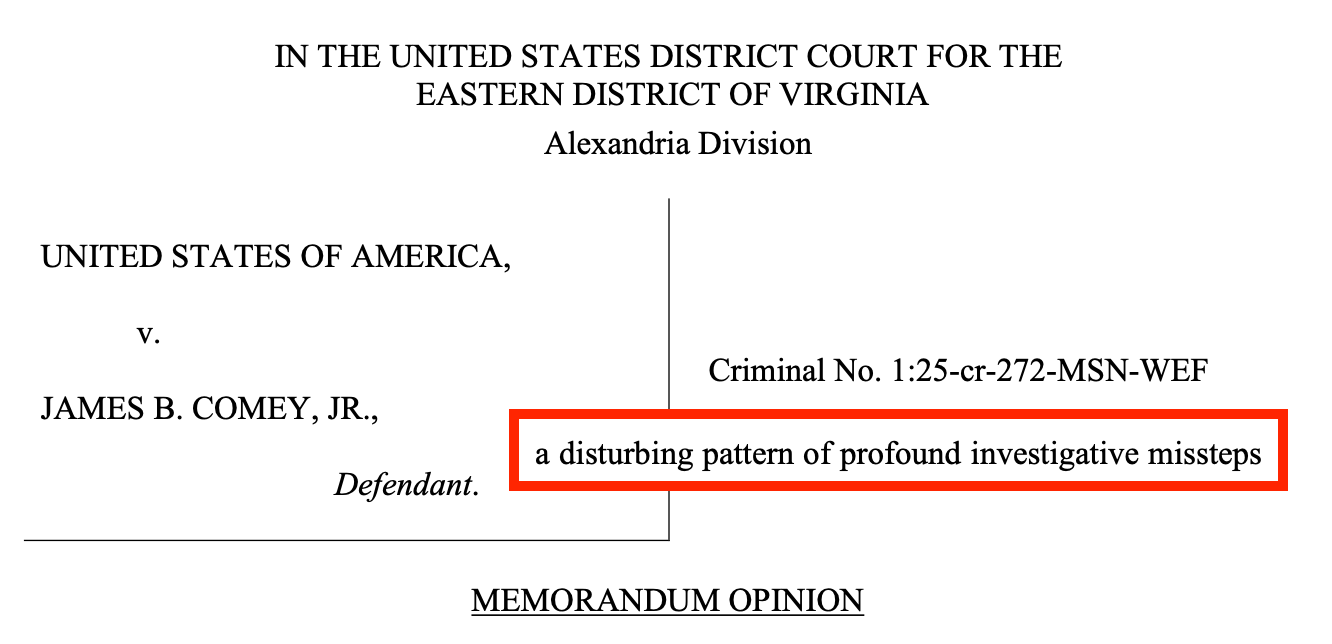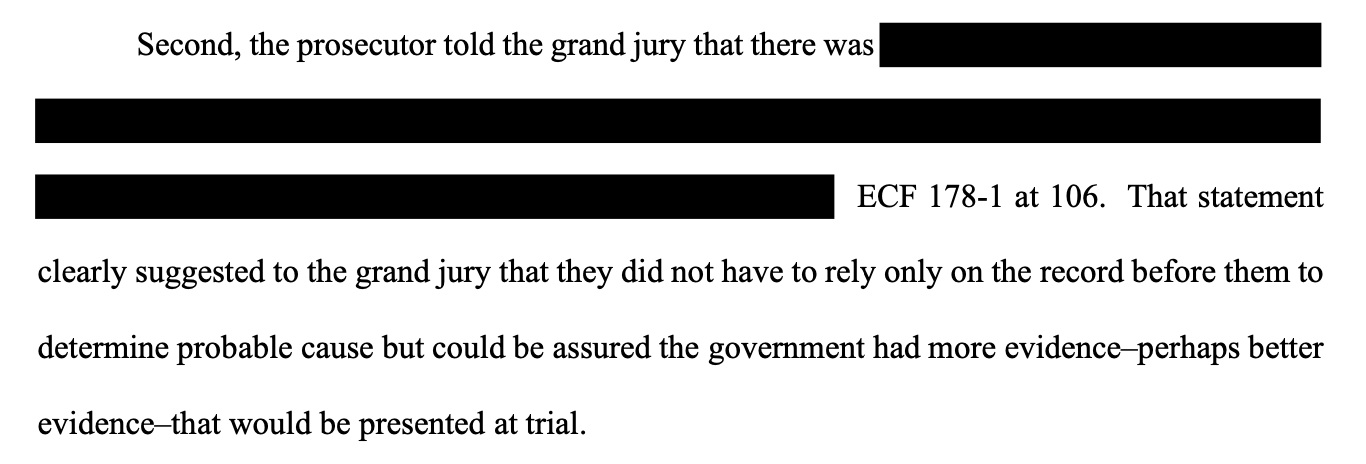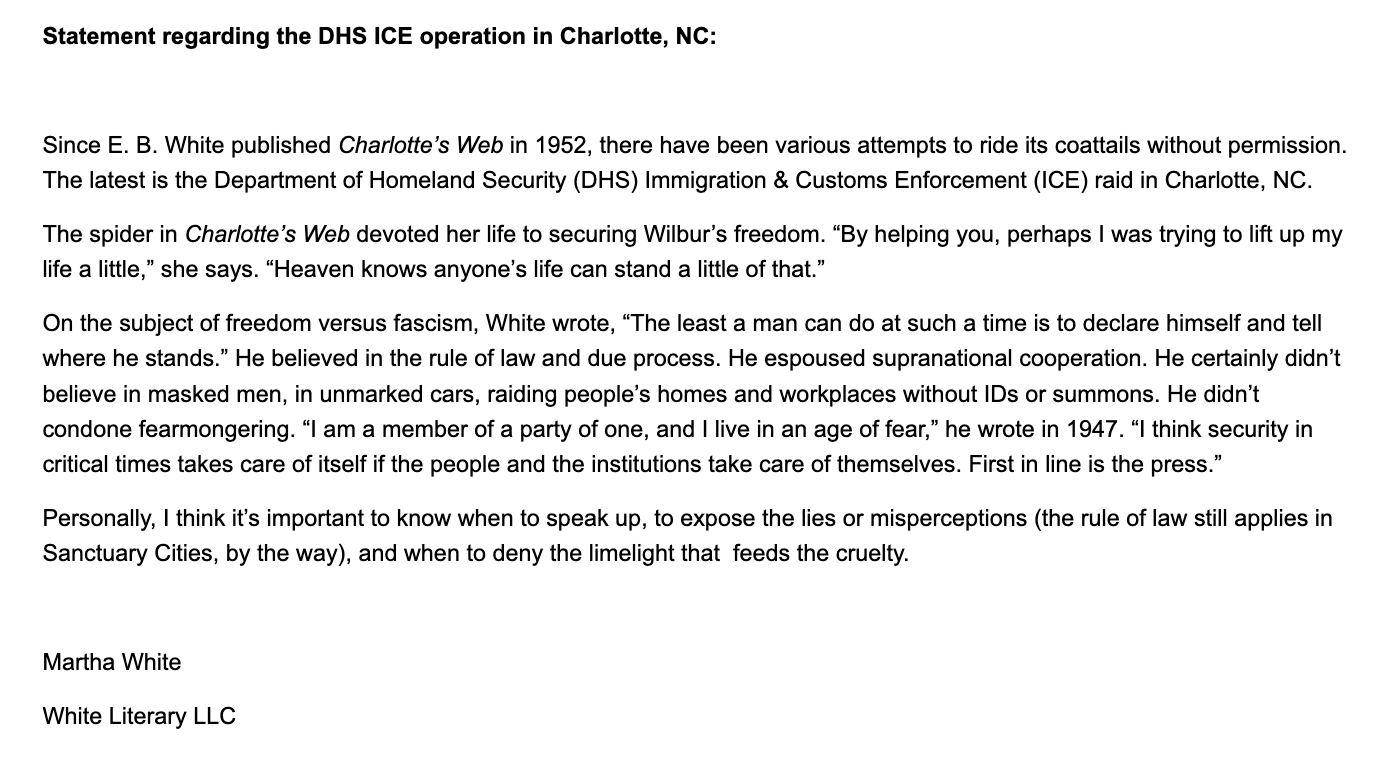11 reasons why (the Jim Comey indictment could get tossed out)
A judge found that Lindsey Halligan appeared to make "fundamental" misstatements of law to the grand jury. DOJ faces skepticism on many fronts. Also: More on Charlotte.
On Monday morning, a federal magistrate judge in Virginia eviscerated attorney Lindsey Halligan over her actions in the case against James Comey, finding that she appeared to make “fundamental misstatements of the law” when presenting the case to the grand jury on September 25.
Further, Magistrate Judge William Fitzpatrick — while noting this is an early step in the process — found that the Justice Department’s treatment of the case “may rise to [a] level of government misconduct” that could lead the federal court to dismiss the case. As he also noted, that could be of particularly harsh effect here because the statute of limitations has since run on the charges Comey faces.
Halligan, as with so many lawyers with key roles in the second Trump administration, previously was President Donald Trump’s personal lawyer. Now, she is the person Trump and Attorney General Pam Bondi have sought to install as the chief prosecutor for the Eastern District of Virginia despite never having made an appearance in a federal court case before she began representing Trump in Florida.
Fitzpatrick’s comments about Halligan and the prosecution more broadly came in response to an order from the district court judge for Fitzpatrick to determine whether there is “particularized and factually based grounds for disclosure” of the grand jury materials“ to Comey’s legal team as part of their opposition to the indictment.
There were particulars. As to Halligan, although the actual grand jury comments remained redacted, Fitzpatrick wrote:
And:
Although these actions are indefensible (if predictable, given Halligan’s lack of experience in any litigation field, let alone criminal law), they were simply two among many inflammatory acts that could doom this indictment.
Ultimately, Fitzpatrick made 11 findings that he asserted “establish that ‘ground[s] may exist to dismiss the indictment because of a matter that occurred before the grand jury[.]’“
As Fitzpatrick detailed, there are questions about how the FBI during the first Trump administration executed the original warrant in a different investigation of Dan Richman (whom Comey hired to represent him after Trump fired him as FBI director), a lack of respect for attorney-client privilege concerns, questions about why the FBI did not seek a new warrant when seeking to use those materials in 2025 for the Comey case, questions about why an agent who might have been exposed to privileged materials testified before the grand jury, and questions about the three-count v. two-count indictments in the Comey case and the related questions about the transcript of the grand jury proceedings.
To lay out just one of those, here is Fitzpatrick on the testifying FBI agent:
(The full list is on pages 20–22 of the opinion.)
He then stated:
The Court need not now determine whether any facts herein have been proven, or whether there is merit to any motion yet to be filed. That task may lie ahead. Rather, the Court is finding that the government’s actions in this case — whether purposeful, reckless, or negligent — raise genuine issues of misconduct, are inextricably linked to the government’s grand jury presentation, and deserve to be fully explored by the defense.
Ultimately, he ordered Comey’s legal team access with a damning conclusion:
[Update, 10:45 p.m.: The Justice Department filed a motion to stay the magistrate judge’s order implementing his opinion, so that DOJ could file objections with the district court judge within seven days. U.S. District Judge Michael Nachmanoff did stay the order — but only gave DOJ two days to file its objections.]
And this was just one of the Monday morning “DOJ in doubt” legal stories.
The latest on Bove and DOJ
At NPR, Ryan Lucas reported that Emil Bove, another former Trump personal lawyer who went into the new administration, had been advocating all along for the boat-strike murders that are now a regular horrifying occurrence from this administration.
Lucas reported:
At a Justice Department conference in February, then-acting Deputy Attorney General Emil Bove told the department’s top drug prosecutors that the Trump administration wasn’t interested in interdicting suspected drug vessels at sea anymore. Instead, he said, the U.S. should “just sink the boats,” according to three people present for the speech.
Bove now is a federal appeals court judge on the U.S. Court of Appeals for the Third Circuit. Even before this latest horror was known, his utter lack of fitness to be a judge was abundantly clear. This just adds to the list of reasons why his impeachment must be sought when Democrats next control the House.
It’s not just Halligan and Bove, either. Over the weekend, The New York Times Magazine laid out “The Unraveling of the Justice Department“ — a story detailing interviews with 60 former DOJ attorneys. It is a horrifying look inside the department. Some of the stories have been told previously, including at Law Dork, but there are a lot of new details in this wide look.
It is a sobering read — both as to what it means now and for thinking ahead about what it will mean after this.
More on Charlotte
In addition to my post Sunday evening, Martha White, the granddaughter of E.B. White and person who oversees the E.B. White Estate, released a statement about Charlotte.
“Since E. B. White published Charlotte’s Web in 1952, there have been various attempts to ride its coattails without permission,” she said in the statement. “The latest is the Department of Homeland Security (DHS) Immigration & Customs Enforcement (ICE) raid in Charlotte, NC.”
Of E.B. White, Martha White explained, “He believed in the rule of law and due process. He espoused supranational cooperation. He certainly didn’t believe in masked men, in unmarked cars, raiding people’s homes and workplaces without IDs or summons.“
Law Dork also reached out Sunday afternoon to HarperCollins, which publishes Charlotte’s Web — along with 1984, for what it’s worth — seeking comment from its Children’s Books imprints about the use of the title, and, following up Monday regarding Gregory Bovino’s use of the quoted material from Charlotte’s Web specifically.
There has been no response. If that changes, Law Dork will publish any response.










Trump proves again — you can’t buy talent … or class.
The fact that there are 11 reasons is insane.